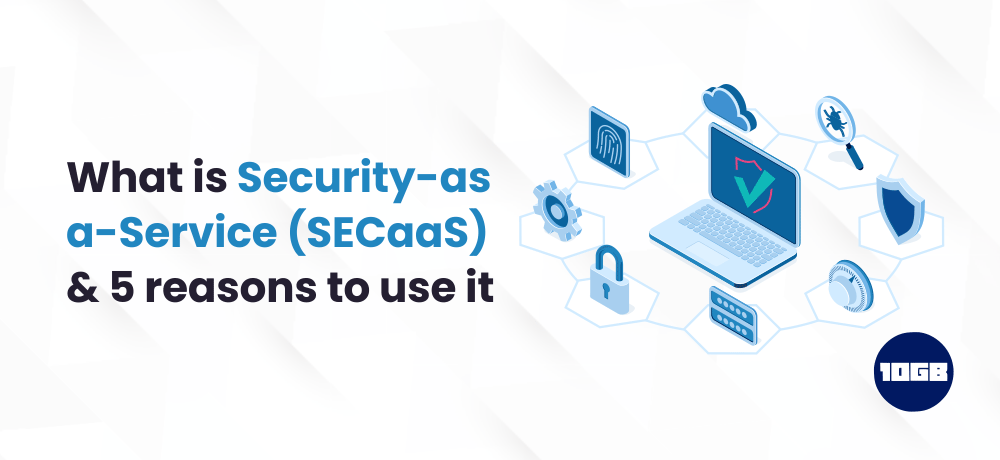In this article, we will be explaining to you what is Security-as-a-Service (SECaas), a few reasons why use SECaaS, and the challenges of using it. So, let’s get started!
In an era where the threat of malicious attacks on the company’s IT resources is alarming, the need for cybersecurity services is becoming vital for businesses of all sizes.
Regardless of whether they are SMBs or big organizations, they need to take preventive measures to secure their own IT infrastructure against various attacks such as Brute Force Attacks, Cross-Site Scripting (XSS), DDoS Attacks, etc.
Now, people who don’t have technical knowledge about securing their server can opt for a cloud-based solution like Security-as-a-Service SECaaS.
Table of Contents
What is Security-as-a-Service (SECaaS)
Security-as-a-Service or SECaaS is a cloud-based model inspired by Software-as-a-Service (SaaS). It is quite similar to SaaS. In SECaaS, the security vendor or managed service provider (MSP) offers cybersecurity services to clients on a subscription basis.
Several businesses are adopting the SECaaS as they want to relieve the responsibilities of the in-house security team and also to avoid the expenses and maintenance cost of on-premise infrastructure.
Having said that, let’s see five benefits of using SECaaS.
5 Reasons to Choose Security-as-a-Service For Your IT Infrastructure
There can be numerous reasons why companies are looking for a cloud security solution to secure their IT Infrastructure. Let’s see the benefits of using SECaaS:
Cost Reduction
When you opt for SECaaS, you are not only cutting the expenses of hiring security experts but also eliminating the software licensing fee.
With SECaaS, you need to pay just for the service that you use, this way you are saving a lot of money.
SMBs who can’t afford to invest in the security of hardware and software or expert security staff can leverage this service.
Expert Support
To cope up with today’s increasing security standards, you need to have well-versed knowledge about securing IT infrastructure. And, several SECaaS providers have security experts teams who have a great understanding of recent security trends and stick to cybersecurity best practices.
If you don’t have that level of expertise, we suggest that you go for SECaaS.
Enhanced Security
When you outsource your security operation to a reliable cloud-based security solutions provider, you get to work with the latest security tools and resources. The security experts will take care of all your security needs such as regularly updating the security tools and virus definitions.
Additionally, they also offer monitoring services to keep track of your infrastructure 24/7. So, even it’s 4 am and your network is under attack, they can take quick and timely actions to stop that attack.
Simpler In-house Management
Most of the Security-as-a-Service providers out there offer a Central management dashboard with their plans. You can use the management dashboard to monitor the resource usage and can determine went to scale up or down accordingly. This gives you complete transparency and assurance that the security experts are ably managing your IT security.
Additionally, with the help of a web interface, you can manage all policy and system changes.
Faster Provisioning
One of the biggest advantages of SECaaS is that it offers instant access to the tools. SECaaS offerings are easily scalable and the resources can be offered as and when the need arises.
Security-as-a-Service Use Cases
Obviously, the security needs of every business are different. It mainly depends upon the size of the business, what sector the business is operating, and the laws that affect a business operation.
Some of the examples of Security-as-a-Service include:
- Continuous Monitoring: Tools that help monitor security process and observe for any unusual activity.
- Data Loss Prevention: Tool that help data loss or theft by checking the integrity of the data.
- Disaster Recovery and Business continuity: Solutions that help take your IT and business operations online instantly after a catastrophic event like cyberattack.
- Email Security: Offers protection against email spam, phising and malicious attachments in the email.
- Intrusion Detection & Management: Tools that recognize and help manage intrusions.
- Identity Access Management/ User Authentication: User management tools that offer access to sensitive information only after the user pass the identity verification check.
- Security Auditing: Examine if the security measures set up in the place are compilant with industry standards.
- Data Encryption: Tools that encrypt your data for secure transmission over a network.
- Realtime Vulnerability Scanning: Tool that are helpful in finding out if your IT infrastructure is vulnerable to any security issues
- Network Security: Cloud-based tools that help monitor activity on network and thereby manage the network access.
- Event Logging: Security solutions that help log and trace events that are happening on your system and then look for any abnormal activity.
Conclusion
Handing over your IT security to a SECaaS vendor is a challenging one. Hence, when you choose a Security-as-a-Service provider, you need to consider the following points:
- Availability: Should be available 24/7
- Quicker Response Rates: Go for a provider that give quick and timely response for your queries, system updates, incidents.
- Disaster Recovery Planning: Pick a provider that collectively work with you to help recognize the threats and vulnerabilities of your IT infrastructure.
- Vendor Partnerships: Go for Security-as-a-Service providers who have expertise in this field and work with industry’s best security solution vendors.
With the increasing amount of cyberattacks across the globe, it has become crucial to follow the latest website security trends in the market.
Meanwhile, you can have a look at our Managed VPS UK plans that offer malware protection, anti-spam & antivirus protection.
